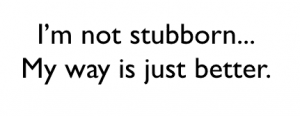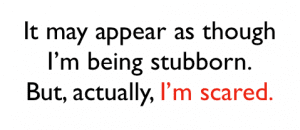 Welcome to the fifth of the nine-part series on dangerous mindsets that can impact situational awareness and, subsequently, the safety of your team. In this article I am going to address the stubborn team member. This individual can be described as one set in their ways, closed minded and perhaps even defiant. Their narrowed view can impact relationships and, more importantly, their situational awareness. Ironically, we use a mule as a visual depiction of stubborn and terms like “Stubborn Ass.” The fact is, the Stubborn supervisor may be acting like a mule.
Welcome to the fifth of the nine-part series on dangerous mindsets that can impact situational awareness and, subsequently, the safety of your team. In this article I am going to address the stubborn team member. This individual can be described as one set in their ways, closed minded and perhaps even defiant. Their narrowed view can impact relationships and, more importantly, their situational awareness. Ironically, we use a mule as a visual depiction of stubborn and terms like “Stubborn Ass.” The fact is, the Stubborn supervisor may be acting like a mule.
Defining stubborn
 I think most of us know what a stubborn person acts like but as I gave this article thought, I was challenged to come up with a good definition. So, as I often do for some inspiration, I turned to Google. The definition offered there fit my needs for this discussion perfectly:
I think most of us know what a stubborn person acts like but as I gave this article thought, I was challenged to come up with a good definition. So, as I often do for some inspiration, I turned to Google. The definition offered there fit my needs for this discussion perfectly:
Stubborn (adjective):
- Having or showing dogged determination not to change one’s attitude or position on something, esp. in spite of good arguments or reasons…
- Difficult to move, remove, or cure.
There’s not doubt a stubborn person can be challenging to work with. I’m sure my co-workers would, on occasion, have labeled me as a stubborn person. I think the more training and life experience we gain, and the more we may perceive ourselves as having expert knowledge on a subject matter, the more we may be susceptible to appearing to be stubborn in the defense of our beliefs of what is right or wrong. Stubborn is not always a bad quality. For example, a training officer who is stubborn about not taking shortcuts in how recruits are trained, despite what may appear to be good arguments for doing so, is an organizational asset, not a liability.
The downside of stubborn
 It can be challenging to open the mind of someone who is stubborn. Why does a person act stubborn? Perhaps they are so used to seeing their point of view as correct that they cannot image any other person’s perspective as being right. I once had a first responder describe the challenges with his stubborn supervisor this way: When I went to work for this officer, I knew his last name was ‘Wright.’ I just didn’t realize his first name was ‘Always.’ When the stubborn supervisor instills this type of feelings among subordinates the underlings are not going to be very willing to tell the stubborn supervisor when they are making a mistake, even if the mistake may result in a grave consequence.
It can be challenging to open the mind of someone who is stubborn. Why does a person act stubborn? Perhaps they are so used to seeing their point of view as correct that they cannot image any other person’s perspective as being right. I once had a first responder describe the challenges with his stubborn supervisor this way: When I went to work for this officer, I knew his last name was ‘Wright.’ I just didn’t realize his first name was ‘Always.’ When the stubborn supervisor instills this type of feelings among subordinates the underlings are not going to be very willing to tell the stubborn supervisor when they are making a mistake, even if the mistake may result in a grave consequence.
If, by chance, the subordinate would tell the stubborn supervisor of the error, the supervisor, because of their stubborn nature, won’t welcome the feedback and won’t admit there may be an alternate point of view.
Habits
Another cause of stubborn behavior comes from being set in your ways. We are creatures of habit and we can gain comfort in doing things a certain way. Any recommendation to do things outside the zone of comfort may be met with resistance or refusal. For the stubborn, the mantra may be: Why change? What I’m doing is working well for me.
Comfort
 The stubborn nature of a supervisor may come with feeling comfortable with doing things a certain way. Suggesting a change can cause a degree of discomfort. Fear of change and fear of consequences from failure are powerful motivators toward resisting new ideas.
The stubborn nature of a supervisor may come with feeling comfortable with doing things a certain way. Suggesting a change can cause a degree of discomfort. Fear of change and fear of consequences from failure are powerful motivators toward resisting new ideas.
Dr. Gasaway’s Advice
 One of the best ways to reach a stubborn supervisor is to employ a principle I learned from Stephen Covey in his book Seven Habits of Highly Effective People: Seek first to understand, then to be understood. This principle has worked very well for me in understanding human behavior. Prior to using this principle, I was quick to judge and quick to do my best to make sure the other person understood my perspective. I wasn’t very interested in understanding WHY they were stubborn. I just wanted the behavior to end. The truth is, until we understand why a person behaves the way they do we can do little to influence a change in the undesired behavior.
One of the best ways to reach a stubborn supervisor is to employ a principle I learned from Stephen Covey in his book Seven Habits of Highly Effective People: Seek first to understand, then to be understood. This principle has worked very well for me in understanding human behavior. Prior to using this principle, I was quick to judge and quick to do my best to make sure the other person understood my perspective. I wasn’t very interested in understanding WHY they were stubborn. I just wanted the behavior to end. The truth is, until we understand why a person behaves the way they do we can do little to influence a change in the undesired behavior.
Oh, so it’s as simple as approaching the person and saying: “Why are you so stubborn?” Well, not exactly. I mean you can take that approach but it’s very likely to put the stubborn person on the defensive and your hopes of making any headway is going to die right there. You cannot have productive communications with a person who is defensive. I would recommend avoiding such a direct approach.
Alternatively, ask general open ended questions that allow you to understand the stubborn person’s point of view and why they feel the way they do. If they are hesitant to open up, don’t pry them open. That will only lead to frustration and distrust. If they’re not ready to talk, give it a little time and try approaching it a different way.
As you seek to understand, versus to be understood, you may learn a great deal about what drives the stubborn person to be so resistive to other ideas. If they open up, you may find that sometime in their past they have suffered some consequence (i.e., a bad outcome or an embarrassing outcome) from being open-minded and open to change. If that were revealed, you’d begin to understand the core of the issue is they are wounded and hurting. That hurt can last for years, even decades. It can be from something that happened on the job or it could be something from their childhood. You never know what you’ll find out when you seek to understand.
Action Items
 1. Think of a person you would describe as stubborn. Discuss a strategy for how you may seek to understand their perspective and learn from them before you seek to have them understand you.
1. Think of a person you would describe as stubborn. Discuss a strategy for how you may seek to understand their perspective and learn from them before you seek to have them understand you.
2. Assume that a stubborn person may just be scared. Chances are they’re not going to admit it to you. Discuss how you can open up a dialog with the stubborn person without being confrontational.
3. Discuss the things you are stubborn about. Chances are you’ll see your point of view as the right perspective (it’s all part and parcel to being stubborn). What can you do to be more approachable to the ideas of others?
_____________________________________________________

If you are interested in taking your understanding of situational awareness and high-risk decision making to a higher level, check out the Situational Awareness Matters Online Academy.
CLICK HERE for details, enrollment options and pricing.
__________________________________
Share your comments on this article in the “Leave a Reply” box below. If you want to send me incident pictures, videos or have an idea you’d like me to research and write about, contact me. I really enjoy getting feedback and supportive messages from fellow first responders. It gives me the energy to work harder for you.
Thanks,

Email: Support@RichGasaway.com
Phone: 612-548-4424
SAMatters Online Academy
Facebook Fan Page: www.facebook.com/SAMatters
Twitter: @SAMatters
LinkedIn: Rich Gasaway
Instagram: sa_matters
YouTube: SAMattersTV
iTunes: SAMatters Radio

Hi,
I wanted to get some detailed info on the following:
How to open up a dialogue without being confrontational?
And how to seek to understand first without trying to be understood at the same time, in other words, without being confrontational?
Your article really helped me, i hope this will save my marriage, but do reply as to how i should approach him? I know he’s scared, but also too stuck in his ways to even listen..what steps should i take?
Thanks,
Amina..
Amina,
I am not trained, qualified or licensed to dispense marriage advice. My advice is for first responders operating at emergency scenes. I’m sorry that I cannot help you.
Rich
Pingback: Situational Awareness Survey | Situational Awareness Matters
Rich, An excellent article; thank you for continuing to care.
Kingsley,
Thank you for the kind words of support. I really appreciate it.
Rich
Thank you for this insightful article. I’m researching obstinate political beliefs. I have family members that are unmovable in their willingness to be open to new information. There is no discussion, compromise, or negotiation. No data presented via any source or medium will change their thinking. The epitome of obstinate thinking.
Thanks sir for this great article
Actually i was a very meek and easy going person but my parents changed my life and i became unchangable
But i cant go back to who i was before again cause am sacred to change
Hello,
I am a student in a small country in Europe. My programme is called Safety and Population Protection. I have to write a small project about stubbornness in first responders mainly in the position of a commander and how it could affect the workplace. In my search for answers, I stumbled upon this article which helped me to get a little closer to finishing my project. I hope you won’t mind me asking these two questions:
– If you have any experience with a stubborn leader/commander, was it entirely negative?
– What qualities should a commander possess to make a great leader during a crisis?
From what I understand from my research and also from my teacher (who is a firefighter), a stubborn commander isn’t someone you want in charge of making big decisions in a crisis.
Thank you if you take the time to answer.
With kind regards,
Anna